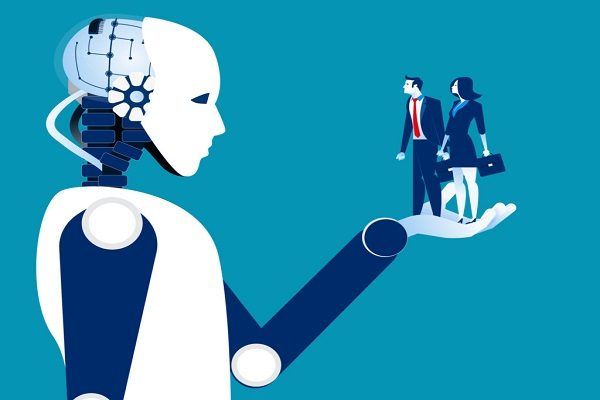A look into recent trends in employee engagement clearly shows the drawback of machines in enhancing human relations. As much as artificial intelligence has made life more comfortable, it has not improved employee engagement.
The last two decades have marked a significant evolution in the world of artificial intelligence (AI), where man and machine now complement each other. Notable changes can be seen in the ways people use technology today, resulting in speedy connectivity and effective self-help. While the growth of AI has contributed to bring the world closer, it has also reduced human interactions. Human connections have now been replaced by artificial intelligence in the sense of self help and machines.
Undoubtedly, the most significant impact of artificial intelligence is the ease of connecting people. With the advent of digitisation and virtual connections, people can connect with others—anytime, anywhere. While this aspect of AI is beneficial, human relations have also been affected. Despite enormous strides in technology, no machines can replace humans. Humans embody emotions, and machines lack emotions. You cannot program emotions, nor can you install them on a computer. They can only be felt, responded to, and managed—all things artificial intelligence cannot do.
Technology and employee engagement
A look into recent trends in employee engagement clearly shows the drawback of machines in enhancing human relations. As much as artificial intelligence has made life more comfortable, it has not improved employee engagement. Even as organisations focus on engaging employees, their investments in AI do not seem to be yielding desired results. Why? A look into the meaning of employee engagement can help shed some light.
Aon, a leading global professional services firm providing a broad range of risk, retirement, and health solutions, defines engagement as the psychological state and behavioural outcomes that lead to better performance. The premise of employee engagement, therefore, is to create a psychological state that gives attention to the employees in order to make them feel connected to the organisation. If this attention is replaced with technology and zero human interactions, problems are created. Emotions begin to build up among employees, eventually leading to disengagement and attrition. But does this mean that artificial intelligence is all bad?
Artificial intelligence is not a bad thing. However, it is essential to understand what the organisation can outsource to artificial intelligence and what needs human interaction. For instance, AI can be a useful tool for conducting surveys, analytics, and understanding the overall mood of the employees. It can also help to reduce the operational processes associated with employee interactions. However, AI should not be used where human interaction is needed.
Balancing it all
Successful integration of artificial intelligence in an organisation lies in the ability to create the right balance between when to use AI and human interactions. If we look at this conflict from an employee’s perspective, engagement could mean something different. Employees are overwhelmed with information and distractions from social platforms. Their attention span is getting shorter with information overload and noise in the ecosystem, making it difficult for employees to hold meaningful dialogues with their managers. With such factors contributing to employee disengagement, AI can replace certain non-human activities. When integrating AI in the organisation, the following pointers are essential:
◆ Create clear guidelines on what should be outsourced to AI
◆ Replace analytics and process efficiency parts of the organisation with AI.
◆ Keep human interaction alive through meaningful dialogues of employees with their managers.
◆ Train your managers to coach (today’s generation needs that more than ever).
◆ Make a clear distinction between drivers of engagement and drivers of enjoyment
.
As artificial intelligence gains popularity, there is a growing need to understand that certain aspects of employee engagement would remain constant. Employees are looking for meaning in their careers, and managers usually provide them with such directions. At the same time, employees want to work where they feel valued and engaged. While AI is essential, it should not replace every aspect of an organisation’s management. Specific vital processes and activities still require the human touch to be effective and engaging. Social interactions are what creates the experience for the employees, giving them a sense of belonging.

Are you comfortable working with dispersed colleagues?
Trending
-
SBI General Insurance Launches Digital Health Campaign
-
CredR Rolls Out 'Life Happens' Leave For Its Employees
-
Meesho Announces 30-Week Gender-Neutral Parental Leave Policy
-
Microsoft Unveils Tech Resilience Curriculum To Foster An Inclusive Future
-
60% Indian Professionals Looking For Job Change Due To COVID: Survey
-
SpringPeople And Siemens Collaborate For Digital Transformation Push
-
86% Professionals Believe Hybrid Work Is Essential For Work Life Balance: Report
-
Almost 1 In Every 3 People's Personal Life Affected Due To Work Stress
-
Meesho Rolls Out Reset And Recharge Policy For Employees
-
80% Of Talent Leaders & Academics Say Pandemic Changed Skill Needs For Youth: Report
-
Hero Electric Rolls Out 'Hero Care' Program For Employees
-
Human Capital In Collaboration With ASSOCHAM Hosts Virtual Conference
-
IKEA India, Tata STRIVE Collaborate To Create Employability And Entrepreneurship Opportunities
-
SAP India, Microsoft Launch Tech Skilling Program for Young Women
-
DXC Technology, NASSCOM Collaborate For Employability Skills Program
-
Lenskart To Hire Over 2000 Employees Across India By 2022
-
Mindtree Launches Learn-and-Earn Program
-
Tata AIA Extends 'Raksha Ka Teeka' To Its Employees
-
Swadesh Behera Is The New CPO Of Titan
-
NetConnect Global Plans To Recruit 5000 Tech Professionals In India
-
Hubhopper Plans To Hire 60% Of Indian Podcasters By 2022
-
Corporate India Needs More Women In Leadership Roles: Report
-
Aon to Invest $30 Million and Create 10,000 Apprenticeships by 2030
-
Tech Mahindra Launches ‘Gift a Career’ Initiative for Upskilling of Youth
-
40% Women Prefer Flexible Working Options in Post-COVID World: Survey
-
3 out of 4 companies believe they can effectively hire employees virtually: Report
-
Vodafone , CGI and NASSCOM Foundation launch digital skills platform
-
Odisha: Bank, postal employees to deliver cash for elderly, differently-abled persons
-
Skill India launches AI-based digital platform for "Skilled Workforce"
-
Hiring activity declines 6.73% in first quarter: Survey
-
70% startups impacted by COVID-19 pandemic
-
Bajaj Allianz Life ropes in Santanu Banerjee as CHRO
-
Over 70 Percent MSMEs look at cutting jobs to sustain businesses
-
93 Per Cent employees stressed about returning to office post-lockdown
-
Johnson & Johnson India announces family benefits for same gender partners
-
Indian firms turning friendly towards working mothers
-
Welspun India names Rajendra Mehta as new CHRO
-
Wipro partners with NASSCOM to launch Future Skills platform



Human Capital is niche media organisation for HR and Corporate. Our aim is to create an outstanding user experience for all our clients, readers, employers and employees through inspiring, industry-leading content pieces in the form of case studies, analysis, expert reports, authored articles and blogs. We cover topics such as talent acquisition, learning and development, diversity and inclusion, leadership, compensation, recruitment and many more.
Subscribe Now











































Comment